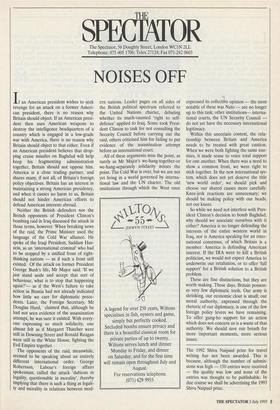SPECT THE AT OR The Spectator, 56 Doughty Street, London WC1N 2LL
Telephone: 071-405 1706; Telex 27124; Fax 071-242 0603
NOISES OFF
If an American president wishes to seek revenge for an attack on a former Ameri- can president, there is no reason why Britain should object. If an American presi- dent then uses American weapons to destroy the intelligence headquarters of a country which is engaged in a low-grade war with America, there is no reason why Britain should object to that either. Even if an American president believes that drop- ping cruise missiles on Baghdad will help keep his fragmenting administration together, Britain should not oppose him. America is a close trading partner, and shares many, if not all, of Britain's foreign policy objectives. Britain has an interest in maintaining a strong American presidency, and when it causes no harm to us, Britain should not hinder American efforts to defend American interests abroad.
Neither the British defenders nor the British opponents of President Clinton's bombing raid in Iraq discussed the attack in those terms, however. When breaking news of the raid, the Prime Minister used the language of the Cold War alliance. He spoke of the Iraqi President, Saddam Hus- sein, as an 'international criminal' who had to be stopped by a unified front of right- thinking nations — as if such a front still existed. Of the attack on former President George Bush's life, Mr Major said: 'If we just stand aside and accept that sort of behaviour, what is to stop that happening again?'— as if the West's failure to take action in Bosnia had not already indicated how little we care for diplomatic prece- dents. Later, the Foreign Secretary, Mr Douglas Hurd, claimed that, although he had not seen evidence of the assassination attempt, he was sure it existed. With every- one expressing so much solidarity, one almost felt as if Margaret Thatcher were still in Downing Street and Ronald Reagan were still in the White House, fighting the Evil Empire together.
The opponents of the raid, meanwhile, seemed to be speaking about an entirely different international order. George Robertson, Labour's foreign affairs spokesman, called the attack 'dubious in legality, questionable in morality', thereby implying that there is such a thing as legali- ty and morality in relations between mod- ern nations. Leader pages on all sides of the British political spectrum referred to the United Nations charter, debating whether its much-vaunted 'right to self- defence' applied to Iraq. Some took Presi- dent Clinton to task for not consulting the Security Council before carrying out the raid, others criticised him for failing to put evidence of the assassination attempt before an international court.
All of these arguments miss the point, as surely as Mr Major's we-hang-together-or we-hang-separately solidarity misses the point. The Cold War is over, but we are not yet living in a world governed by interna- tional law and the UN charter. The old institutions through which the West once expressed its collective opinion — the most notable of these was Nato — are no longer up to this task; other institutions— interna- tional courts, the UN Security Council — do not yet have the necessary international legitimacy.
Within this uncertain context, the rela- tionship between Britain and America needs to be treated with great caution. When we were both fighting the same ene- mies, it made sense to voice total support for one another. When there was a need to show a common front, we were right to stick together. In the new international sys- tem, which does not yet deserve the title 'new world order', we should pick and choose our shared causes more carefully. Knee-jerk reactions are unnecessary; we should be making policy with our heads, not our knees.
So while we need not interfere with Pres- ident Clinton's decision to bomb Baghdad, why should we associate ourselves with it either? America is no longer defending the interests of the entire western world in Iraq, nor is America speaking for an inter- national consensus, of which Britain is a member: America is defending American interest. If the IRA were to kill a British politician, we would not expect America to underwrite our retaliation, or to offer 'full support' for a British solution to a British problem.
These are fine distinctions, but they are worth making. These days, Britain possess- es very few diplomatic tools. Our army is shrinking, our economic clout is small; our moral authority, expressed through the rhetoric of our diplomacy, is one of the few foreign policy levers we have remaining. To offer gung-ho support for an action which does not concern us is a waste of that authority. We should save our breath for more important moments, more serious issues.


















































 Previous page
Previous page